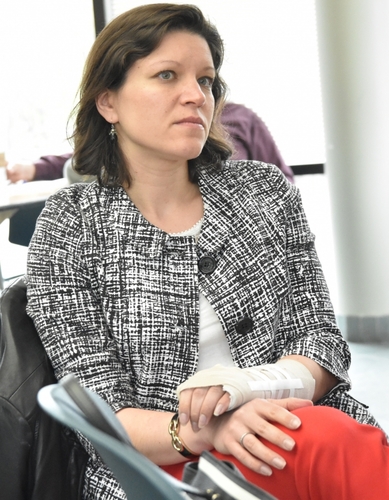PUTNEY — With the first three months of Donald J. Trump's presidency in the books, three aides who work for Vermont's Congressional delegation offered a bit of short-term optimism on May 3 about what might happen to critical federal programs under the Trump adminstration.
At a forum at Landmark College presented by the Brattleboro Development Credit Corp.'s Southern Vermont Economy Project, the overriding theme was for Vermonters to not panic over proposed cuts to programs that aid rural communities.
“There are a lot of opportunities,” said Chris Saunders, field representative for U.S. Sen. Pat Leahy, D-Vt., adding that Leahy has been telling his staff to “set aside the noise” and not get caught up in the daily drama of the news cycle.
Leahy is the vice-chair of the Senate Appropriations Committee, and played a big role in pulling together Republicans and Democrats to approve a $1.1 trillion stop-gap funding bill that will keep the federal government running until Sept. 30.
It was approved by the House on May 3, 309-118, passed the Senate on a 79-18 vote, and was signed into law by President Trump on May 5.
“He helped hold the line against the worst of the cuts, and pushed back where he needed to,” Saunders said of his boss.
Rural development funds
One of the areas of pushback was for preserving funds for the U.S. Department of Agriculture's Rural Development program, which last year brought $57 million to Vermont for a variety of economic development projects.
Saunders called it “one of the most effective economic tools” available to rural areas.
“It's all money that is critical for Vermont,” said Kathyrn Becker Van Haste, director of health policy for U.S. Sen. Bernie Sanders, I-Vt.
Also preserved in the stop-gap bill was $3 billion in funding for the Community Development Block Grant program. Van Haste said while this program is being level-funded for the remainder of fiscal year 2017, it was slated to be cut altogether, “so it's a win for us.”
Calling his boss “a practical person,” George Twigg, the state director for U.S. Rep. Peter Welch, D-Vt., said that while bipartisanship may seem to be in short supply in the House, the stopgap budget that Welch worked on “has lots of things that Democrats and Republicans both like.”
Twigg said the centers of both parties are coming together in opposition to many of the funding priorities of President Trump and his administration's proposed fiscal year 2018 budget, which seeks sharp cuts in domestic spending to help fund tax cuts for the wealthy and corporations and increased military spending.
“It's an alarming document,” Twigg said, “but the process has a long way to go, and people should remember that it is Congress that writes the federal budget, not the president.”
Van Haste said rural communities need to “think broadly” and see the connections between the various elements that go into creating economic stability.
“Economic stability affects economic development. Think outside the normal lanes for economic development. People need a place to live, health care, and child care. Find out where those needs are. The more stable the least fortunate person in your community is, the better that businesses will be able to thrive.”
Health care and stability
One of the big things that affects stability, she said, was access to health care. The day after the Landmark forum, the House voted to repeal the Affordable Care Act, 217-212, with no Democrats voting in favor of repeal. Both Sanders and Leahy said they would block the repeal bill in the Senate.
Van Haste said more Americans are coming around to an idea that her boss has touted for years - expanding Medicare to all Americans. She said Sanders, who is about to introduce a Senate bill to create a single-payer system based on Medicare, believes “it's the right thing for patients and also the right thing for businesses.”
The three aides also emphasized the need for collaboration and for seeking partners for programs beyond southern Vermont.
Saunders pointed out that USDA Rural Development “gives priority to cross-regional proposals” in making grants, while Twigg cited the Green Economy Innovation Hub, one of BDCC's economic programs, as a great example of interstate collaboration.
“Keene, N.H., is a lot closer to Brattleboro than Burlington is,” Twigg said.
While Vermont wasn't a big supporter of Trump in the 2016 presidential election, the aides reminded the audience that Trump received much of his electoral support from rural states and this was a point Vermont should take advantage of, particularly when the Farm Bill comes up for its quadrennial update next year.
“This is a chance to collaborate with the Trump administration,” Twigg said. “The new Farm Bill will give us a chance to find ways to help Vermont.”
Saunders said Trump's rhetoric about helping rural America hasn't been matched by his actions so far, but with the members of the Vermont Congressional delegation on key committees, there is a chance for Vermont to get its fair share of federal funding.
But Saunders also reminded the audience that “the real work of economic development happens in rooms like these.” Along with Twigg and Van Haste, he urged audience members to stay in touch with the delegation and let them know about any problems or concerns.
“If we don't know about it, we can't help solve the problem,” Saunders said.
